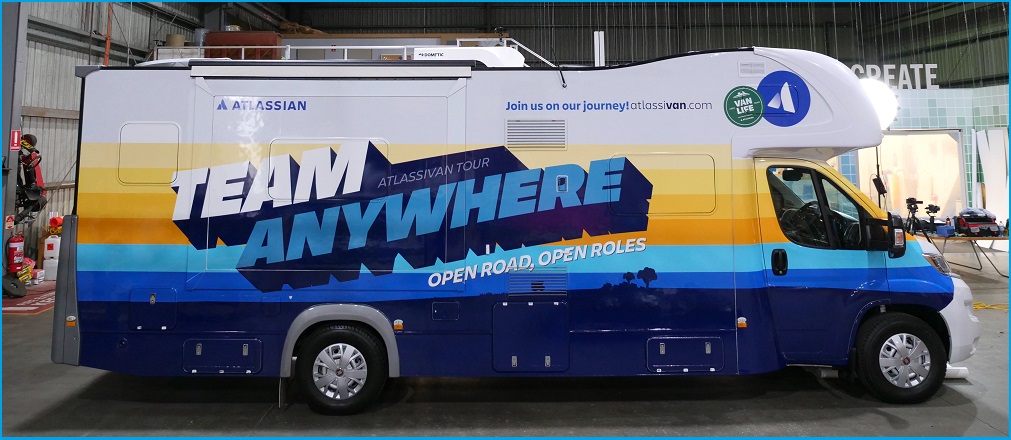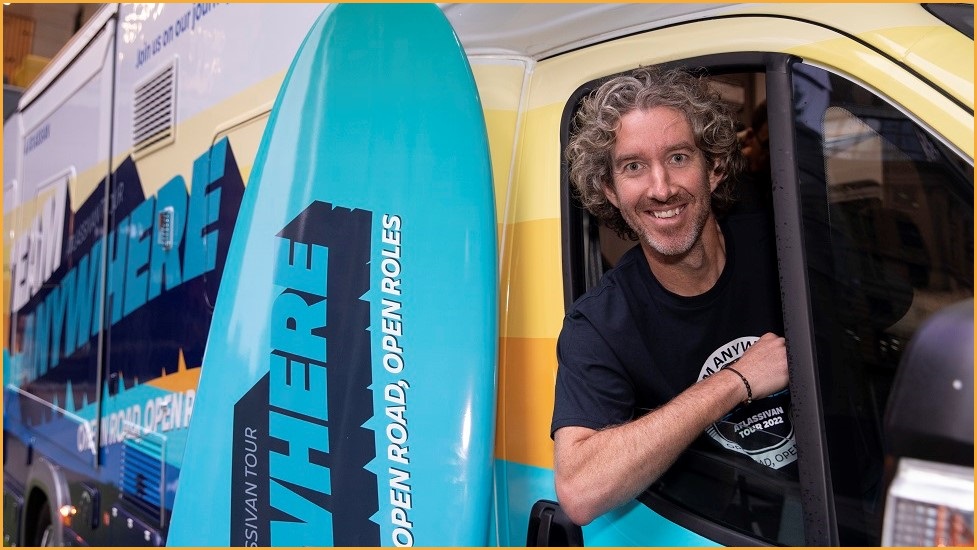Atlassian has launched a literal recruitment drive, with the homegrown tech giant to drive a van around the country with an aim of attracting more than 1,000 new employees in the next 12 months.
Atlassian is a giant of the Australian tech sector, with a current market cap of $US34.49 billion ($53 billion) and nearly 9,000 employees around the world.
At the federal government’s Jobs and Skills Summit in September, Atlassian announced its plan to hire 1,032 research and development-focused employees in the next year.
On Wednesday the tech firm unveiled its novel plan to help reach its ambitious goal.
An Atlassian-branded RV, dubbed the AtlassiVan, will travel across the country, commandeered by a recruitment team spruiking the company’s “work from anywhere” policy.
The AtlassiVan was stationed at Martin Place in Sydney on Wednesday, and will be embarking on a month-long road trip, with stops in Canberra, Wollongong, Melbourne, Adelaide, Newcastle, Brisbane, Gold Coast and the Sunshine Coast.
Some of the roles Atlassian is hoping to recruit in include data and analytics, data scientists, engineering, marketing, customer experience and product management.
Atlassian launched its work from anywhere policy in April 2020 during the initial COVID-19 lockdowns.
It has now been made permanent, with employees only expected to visit an office in-person about four times a year.
“We believe the future of work is distributed because amazing talent exists everywhere,” the company said.
“All Atlassians have the freedom to choose where they work – whether it’s at home, an office or a van.”

The AtlassiVan in all its glory. Photo: Supplied
Atlassian employees can choose whether to work remotely, in one of its offices, or a combination of both.
About a third of Atlassian’s total workforce is based in Australia, and a quarter of these employees are now working in remote locations, which the company defines as being at least a two-hour commute from its headquarters in the Sydney CBD.
Atlassian now has more than 25 employees across Wollongong, Newcastle and Adelaide.
Significantly, about half of Atlassian new hires in the last two years have been remote.
This will be a competitive advantage for the company amid the global skills shortage, Farquhar said.
“Some companies have chosen to push their employees back to the office full time. And that’s not working at all,” Farquhar said, as The Daily Telegraph reported.
“There are still more tech jobs out there than there are people to fill them. One of the things we’ve got is we can hire people all across Australia and New Zealand, around the world. If someone wants a job in the tech industry, there are really high paying jobs, people stay in the industry longer.
“There’s less of a gender pay gap than other high paying industries. Like, these are great jobs that everyone wants – and you can work from regional or rural Australia.”
Earlier this year Atlassian unveiled a plan to hire 5,000 Australia IT workers in the coming years, and a global plan to increase its total headcount from nearly 9,000 staff to 25,000 people by 2026.
While accelerating its remote working philosophy, Atlassian is also building a 40-storey building as its new headquarters in Sydney, which is set to be the tallest hybrid timber building in the world when it is completed in 2025.
It’s been a big week for Atlassian, with the company officially moving its parent company from the UK to the US recently, after announcing plans for this in February.
The company said this move will “increase access to a broader set of investors, support inclusion in additional stock indices, improve financial reporting comparability with industry peers, streamline its corporate structure and provide more flexibility in accessing capital”.
A number of updates were also rolled out this week for Atlassian products, such as new smart links and unified administration controls, along with a new subscription service for its work management and collaboration products.
Shares in the company jumped by nearly 10 percent earlier in the week.










